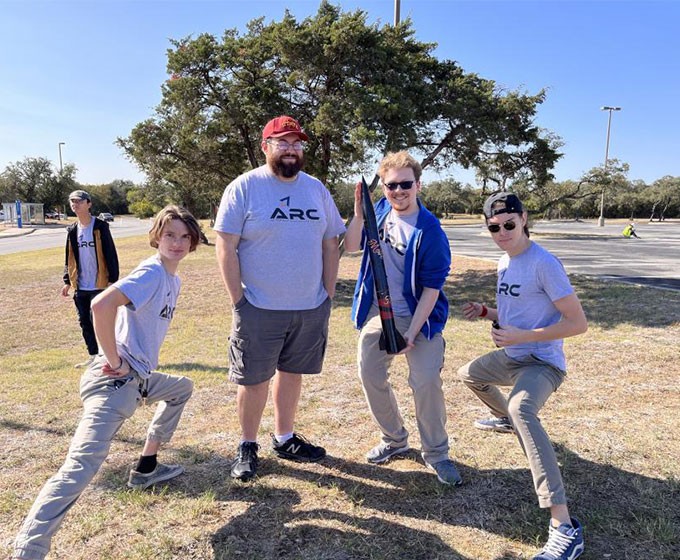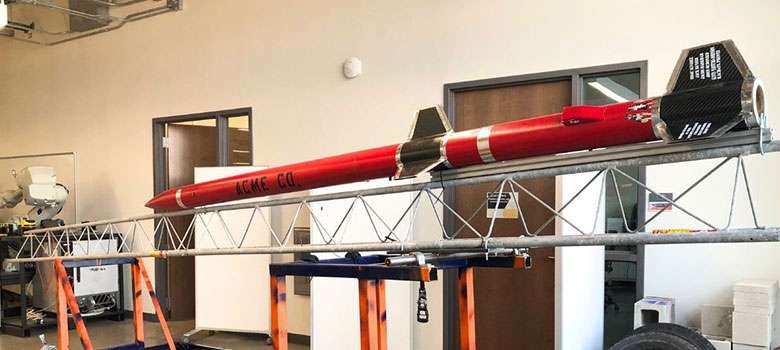
MAY 4, 2023 — The Aeronautics and Rocket Club at UTSA (ARC) will participate in its second Spaceport America Cup, a competition taking place in Southern New Mexico from June 19 to June 24. With over 150 institutions participating in the event, UTSA's ARC will stand out as one of the few teams flying a hybrid propulsion system rocket in contrast to more than 130 teams that will fly solid propulsion system rockets.
The team has been working enthusiastically for months on the rocket, named Linda. It has been a challenging task for them, as constructing a hybrid rocket comes with its own complexities. The team is incorporating the extensive plumbing needed to deal with the liquid propellant stages, which would not have been required for a solid propulsion system. Vent procedures, electronic ground support and instrumentation are also more complex.
ARC President Haven Russell says the experience has been educational and challenging. He encourages students to "try not to shy away from a challenge.”

The team has spent months working on their hybrid rocket named Linda. They also built a launch trailer for the rocket.
Tapping his leadership skills, innovative vision and mechanical engineering knowledge, Russell keeps the team motivated and encourages it to push boundaries. For example, in addition to building the rocket for the Spaceport America competition, the team decided to construct a 30-foot mobile launch trailer. They finished its construction within two months, an effort that will give the club a medium to test rocket propulsion system static thrusts in the future.
Although a young UTSA student organization, ARC has been making its way to the skies since its formation. It has consistently grown, from securing invitations to the 2020 NASA Student Launch competition for the first time in UTSA's history to participating twice in the world's largest intercollegiate rocket engineering conference and competition: the Spaceport America Cup. The club has shown considerable progress and has provided passionate Roadrunners with a platform to apply their classroom knowledge, equipping them with competitive skills to launch successful careers.
ARC's growth directly reflects UTSA's commitment to experiential learning. Along with classroom-to-career learning opportunities, UTSA provides its students with technical resources to test their classroom knowledge in a real-world environment.
"At UTSA, we have the state-of-the-art, the best-advanced technology to use,” said Nathaly Amaya, a UTSA chemical engineering student and ARC's public relations officer.
From metal and regular 3D printers, laser spectroscopy and chemical propulsion labs to creative spaces with tools for working on complex projects, UTSA students have the support they need to bring their complex ideas to life. Additionally, the club receives constant support and guidance from faculty members such as Daniel Pineda, an assistant professor in the UTSA Department of Mechanical Engineering.
Building rockets is an expensive passion that requires significant funding. Apart from the UTSA funds that ARC receives, it also accepts private donations from faculty and community members.
To compete at this year's Spaceport competition, the students have raised $6,621 out of their $10,000 goal through a crowdfunding campaign. Donors receive certain rewards, like name engravings on the rocket and other perks.
"We definitely always want to give back, and we think that is important," said Amaya, who shared her vision to attract corporate sponsors in the future.
Since UTSA alumnus Erick Castillon ’19 formed ARC in 2016, the club has welcomed members from all academic backgrounds.
"We want the club to be a melting pot of ideas, people and knowledge," said Russell. "I try really hard to make the organization as multifaceted as possible, to appeal to as many different majors as possible."
ARC holds STEM nights at schools, where the students display their projects and provide simplified explanations to kids to spark an interest to come to UTSA and join the club. They have also successfully collaborated with other teams like the Robotics and Automation Society at UTSA and at events such as the Monster Mash Pumpkin Smash. At the latter, the team trained a group of about 35 engineering and non-engineering-related participants how to design and launch rockets.
"We teach you everything. Just show up, and we will show you what you need to do,” said Amaya.
Although there is a paid membership fee, ARC uses that funding entirely to benefit its members by providing them the means and resources to attain L1 certification. This expertise enables the students to fly high power rockets and authorizes them to purchase high-level equipment.
The club also has strict protocols to ensure that hazardous materials are handled safely by students with the proper certifications.
Students who join ARC work on research-heavy projects, compete in major competitions and develop skills that will make them stand out in the job market.
Castillon is an example of that. After graduating from UTSA, he went on to join NASA and currently works there as a systems engineer.
UTSA Today is produced by University Communications and Marketing, the official news source of The University of Texas at San Antonio. Send your feedback to news@utsa.edu. Keep up-to-date on UTSA news by visiting UTSA Today. Connect with UTSA online at Facebook, Twitter, Youtube and Instagram.
Move In To COLFA is strongly recommended for new students in COLFA. It gives you the chance to learn about the Student Success Center, campus resources and meet new friends!
Academic Classroom: Lecture Hall (MH 2.01.10,) McKinney Humanities BldgWe invite you to join us for Birds Up! Downtown, an exciting welcome back event designed to connect students with the different departments at the Downtown Campus. Students will have the opportunity to learn about some of the departments on campus, gain access to different resources, and collect some giveaways!
Bill Miller PlazaJoin us for an intimate evening of cocktails, conversation, and culinary inspiration with Pati Jinich, Emmy-nominated chef and James Beard Award-winning author. Enjoy light bites and signature drinks in the warm, modern setting of Mezquite as Pati connects with guests over her passion for Mexican cuisine and storytelling.
Mezquite Restaurant in Pullman Market, 221 Newell Ave., San Antonio 78215From inspired courses to thoughtful pairings and a rich sense of community, the Ven a Comer Signature Dinner is a night of shared meals, shared stories, and unforgettable flavor.
Stable Hall (Pear Brewery), 307 Pearl Pkwy, San Antonio 78215Come and celebrate this year's homecoming at the Downtown Campus with food, games, giveaways, music, and more. We look forward to seeing your Roadrunner Spirit!
Bill Miller PlazaThe University of Texas at San Antonio is dedicated to the advancement of knowledge through research and discovery, teaching and learning, community engagement and public service. As an institution of access and excellence, UTSA embraces multicultural traditions and serves as a center for intellectual and creative resources as well as a catalyst for socioeconomic development and the commercialization of intellectual property - for Texas, the nation and the world.
To be a premier public research university, providing access to educational excellence and preparing citizen leaders for the global environment.
We encourage an environment of dialogue and discovery, where integrity, excellence, respect, collaboration and innovation are fostered.